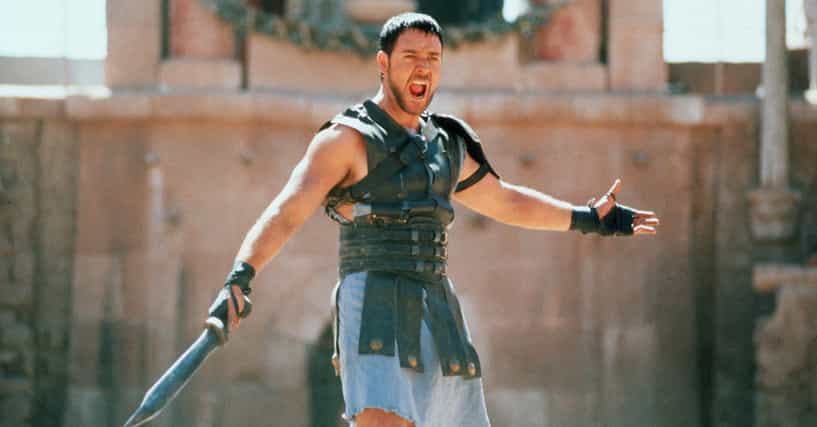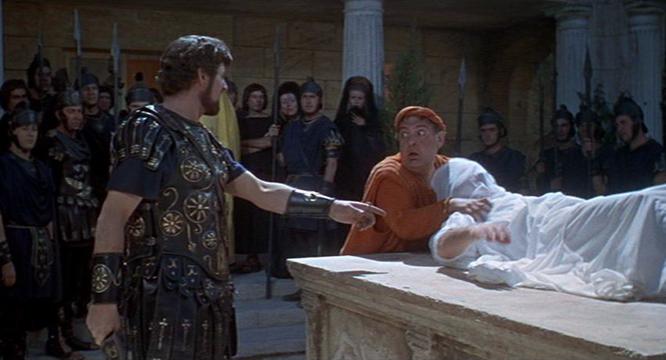Maximus Decimus Meridias in “Gladiator” and King Leonidas in “300” show common characteristics that a heroic protagonist must have in a 20th century sword and sandal film. Ridley Scott, the director of Gladiator, and Zack Snyder, the director of 300, give us a main character that the audience gets to analyze and then root for as they show us their virtues throughout their respected films. After analyzing both characters, it is conclusive that a 20th century sword and sandal protagonist must be strong mentally and physically, be courageous and brave, and be able to lead while gaining respect from those around them.
“Gladiator” (dir. Scott) opens with Maximus and his army fighting in a battle. In the opening moments it is clear that Maximus is a superior warrior, and a very respected general of the Roman Army. “Strength and honor” is a saying used amongst the soldiers, and it tells the audience two virtues that are important to the Roman army. It is evident in the fighting scene that the army fights with strength and honor, and this is a direct reflection of their general Maximus. Maximus and his army win a very lopsided battle brutally overcoming the army of Germania. It is clear from the opening scene that Maximus Meridias is very strong mentally and physically, fights courageously, and has clear respect from all of his soldiers. “The character of Maximus reaches back to an idea of masculine bravery and goodness” (Cyrino 229).

“300” (dir. Snyder) starts the plot with a Persian messenger coming with a threatening message from Xerxes. Xerxes asks for a sacrifice of “Earth and Water” meaning land from Sparta. As a result of this request King Leonidas kills the messenger and eventually takes a small army to battle the enormous Persian army ruled by Xerxes. It is clear that Leonidas embodies strength and shows no weakness in any aspect of his life. He fears nothing, and the Spartan soldiers who follow him show their respect when they follow him to the battle of Thermopylae even when it was treason to do so and had no real chance of defeating the entire Persian army. King Leonidas feels disrespected by the Persian messenger, and because he fears nothing he stands against the enormous Persian army. His actions show the traits of strength, bravery, and leadership throughout the entire film and it is clear to the audience what King Leonidas stands for. “(The) stand against the invading Persian army at the pass of Thermopylae in central Greece is one of the enduring tales of Greek heroism, invoked throughout Western history as the epitome of bravery exhibited against overwhelming odds” (Britannica 1).

The death scene for a sword and sandal protagonist is like the icing on a cake. Maximus and Leonidas both die in ways that emphasize the characteristics and morals that they stand for. Maximus dies at the hand of Commodus, who Maximus had just killed in a setup gladiatorial battle. He essentially sacrifices himself for the good of Rome because now they are free of a terrible Caesar. Leonidas dies because his small group of Spartan soldiers were surrounded by the hundreds of soldiers of the Persian army. Leonidas was given the option to surrender, but Leonidas instead chose to fight until his glorious death, where he died with honor. The death scenes in these two films make the audience certain that these two characters are extremely brave and strong. They both die with honor and belief in what they stand for. The death of a hero protagonist in a sword and sandal film is a very important part of the movie because it will show just how courageous the character is. These kinds of deaths are inspired from previous sword and sandal films that came before them. “Like Spartacus, the proud Maximus is subject to humiliation and brutality in the Roman arena. Both Maximus and and Spartacus die virtually sacrificial deaths in the daring effort to achieve their goals” (Cyrino 230).
The inspiration for these heroic traits is a result of characteristics that characters from older sword and sandal films possessed. Stanley Kubrick, the director of the 1960 sword and sandal film, “Spartacus” gives us a protagonist hero that possesses similar virtues that Maximus and Leonidas also have. All of which are strong, brave, and great leaders. And all of which die for what they believe in sacrificing their own life for the good of the purpose they fight for.

The hero of a sword and sandal film has always seemed to be loved by the audience. The viewer must be able to root for the protagonist of a sword and sandal film, or else the movie will not be as entertaining. If they did not possess these traits, then the audience would see them as weaker and will not get the experience that the director would want them to get. Although all of these characters may fight for different purposes and in different settings the traits of strength, bravery, and leadership are easily spotted in all of these heroes. This makes for a more entertaining movie, and a protagonist that the audience grows to love and root for.
Works Cited
Britannica, The Editors of Encyclopedia. “Leonidas”. Encyclopedia Britannica, 7 Jan. 2019.
Cyrino, M. 2005. Big Screen Rome. Blackwell Publishing, Malden, MA.
Scott, Ridley. Gladiator. 2000. DreamWorks Distribution, Glendale, California.
Snyder, Rick. 300. 2006. Warner Bros, Burbank, California.



